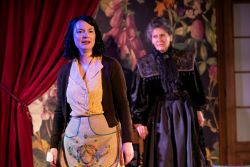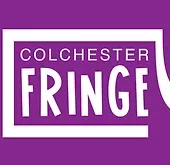FringeReview Scotland 2025

Low Down
Set in the 1930’s this tells the tale o the Galbraith family who own the local jeely factory. Matriarch Jessie is dieing and getting closer and closer to the final chapter. Her son, Duncan has not spent time with her for over ten years, despite living in the same house. Shuttling between them without the diplomacy, maid Rebecca begins by being respected by Duncan and valued by Jessie until a reconciliation between mither and son sees her tea quite literally being oot. Her solution shows the guile of a woman faced with unfavourable odds.
Review
There are layers and layers to The Needle Room which unravel over the discourse between Rebecca and Jessie and are mirrored in Rebecca’s interaction with Duncan. Beginning with both masters holding her in some esteem, their sharp tongues and fiscal privilege eventually show their true motives as their blood thickens and so does their relationship which makes them even more dismissive and exploitative of Rebecca. The key skill in the script is not just to keep us inside to the intricacies of each twist in the narrative but give us characters who are both identifiable and humane whilst also showing their darker sides.
Playwright Martin Travers was inspired to write this fictional tale having seen on one of his regular walks of his dog, the house in he distance. A striking monument it boasts a room, a Needle Room, of the title of the play, where the fictional Jessie terrorised the caw haunded Rebecca to write with her right hand. The seeds of their relationship, born in the story of how Rebecca became a ward and concern of the Galbraiths is tough to hear when the tension is unbearable. The theft o the siller by Rebecca a catalyst which shows that all have secrets even if they hae guid reason for them.
It’s not hard to see the parallels that exist between the 1930s and today given the numbers of people who are quite prepared to chant slogans which up until recently were frowned upon. Slogans which have their genesis in nearly 100 years ago. However, the cleverness here is not that Braw Clan take on the themes and views and opinions of today by looking at the past but by taking the views and opinions of the past and allowing us to apply them to today.
But it is not just the source material which anchors this in Lanarkshire, but also the approach taken by Braw Clan to prove once more that think local act global is a thing. This sold out almost instantly as it will traverse the county, playing in church halls and local centres so that the people of the community get theatre on a doorstep which is not too far from their homes. And what they get is a superior product, which has a decent start – a very adept script.
Rosalind Sydney takes that script and has crafted a piece of cunning theatricality as Duncan begins more as a dandy and ends as a tyrant. Jessie always shows her true colours with us as the audience aware of her potential whilst Rebecca is skilfully positioned to be the surprise package. It is well begun with Fletcher Mathers, playing a fearsome, sharp-tongued Jessie slowly rising to the top of the set to hangover it like the Corbie o death.
Strength comes from the female characters who show two sides of themselves – positively understanding and ruthless. Mathers as jessie and Shannan Lynch as Rebecca spark off each other and Lynch manages to harbour the strength she possesses with hints and a nuance that shows a real affinity with the character and an exceptional ability to understand both text and direction.
As Duncan, James Mackenzie pieces together a man of conflict who begins by being sympathetic until he emerges with the pathetic uniform of the black shirts to nail his colours to the mast of “The Movement”. It is well positioned in comparison to the bearing of the two female characters onstage.
Eschewing the stage within the venue to give us a piece of theatre on our level and more intimate was a bold and excellent piece of decision making, with platforms for sight lines and lighting ensuring that there was an intimate atmosphere, allowing the audience to feel maybe not part of it, but certainly engaged in it.
Gordon Dougall’s music, an original composition for the show, lifted and enhanced that emotive connection.
This is a complex piece of theatre, very Greek, quite Arthur Miller in the way in which it slowly unfolds. The denouement is tragic and dramatic, but at the same time foreshadowed well. Braw Clan are a phenomena within Lanarkshire and both are all the better for it. It speaks to its own community and its own culture. The use of Scots is exemplary. The connection and freedom given to artists with it oan yer tongue gives the energy and pride that maks this, muckle worthy. Taken back to the past, perhaps we have the opportunity to put a little bit of effort into changing the future, so that we didn’t end up being a carbon copy of the past. Aye, a warning tae heed.





























